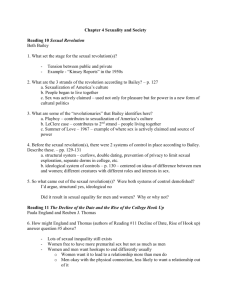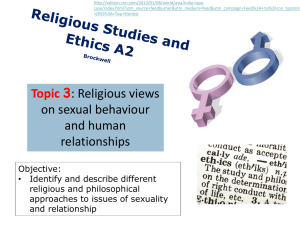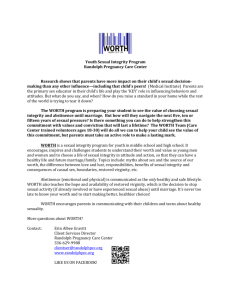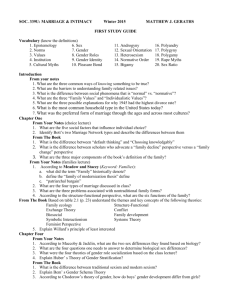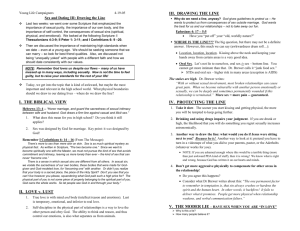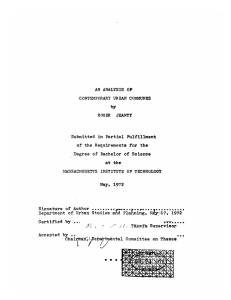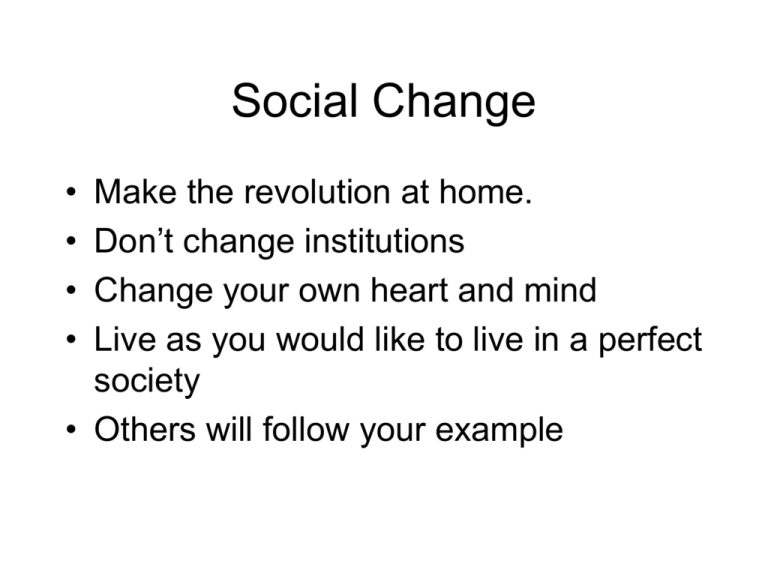
Social Change
•
•
•
•
Make the revolution at home.
Don’t change institutions
Change your own heart and mind
Live as you would like to live in a perfect
society
• Others will follow your example
Social Change: hearts &
minds
• It was a chance to be freely youthful
and not live up to anybody’s
expectations, and to re-create the world
in the way we thought was right, which
really didn’t happen. But we made the
world a lot more colorful.
• I think the best way to make a
statement is by example. Be the best
person you can be and show others that
kindness gets you what you need and is
more effective than cruelty or judgment.
Q: Did he influence young
People because he broke
The rules?
Dylan: It’s not a question of
Breaking the rules, don’t
You understand? I don’t break
The rules because I don’t see
any rules to break. As far as I’m
Concerned, there aren’t any rules.
• The idea was the politics of
consciousness. ..if you could get people
thinking clearly, they’d free themselves.
They key is freedom So everything that
Abbie did was to get you to dissolve, or
to undermine, or to undercut or to
loosen up the shackles that keep all of
our minds from being free,
"The most important kind of freedom is to be what
you really are. You trade in your reality for a role.
You trade in your sense for an act. You give
up your ability to feel, and in exchange, put on a
mask. There can't be any large-scale revolution
until there's a personal revolution,on an individual
level. It's got to happen inside first. You can take
away a man's political freedom and you won't hurt
him- unless you take away his freedom to feel.
That can destroy him. That kind of freedom can't
be granted. Nobody can win it for you."
--Jim Morrison, lead singer of the Doors
.
• How does the individual imagination get
liberated and self-empowered? And
then how do you bring it down to earth
and one of Kerouac’s answers to that
was “walking on water wasn’t built in a
day.”
• To create events which had their
meaning implicit in them and which, by
performing them, created the culture
that you’d rather live in. You didn’t have
to propagandize, you just performed the
acts, and they invoked the change itself.
• The effects of 60’s cultural revolution. . .
Everyone is trying to prove that nothing
happened or that America has gone
back to apple pie and right-wing
militarism and so forth. . . The victories
won in the 60’s can never be
undermined, because they’re victories
in people’s minds. And once you free
people’s minds, it’s very hard to turn
them off again.
• When we came to the 60’s, America
had a system of legalized apartheid. . .
We did not end racism, but we ended
legalized apartheid in this country. And
they will never go back on that.
• We did not end militarism in this
country, in the world, but never again
will the American people allow a military
clique in the Pentagon to send a million
young people a 1000 miles across the
globe to fight a war that the people do
not want.”
Social change: communes
Emerson:
Man postpones or remembers; he does not live in the
present, but . . . laments the past, or, heedless of the riches that
surround him, stands on tiptoe to foresee the future. He cannot be
happy and strong until he too lives with nature in the present.
Wedding in New Buffalo
Yoga class at New Buffalo
209,210,212,213
Thoreau:
It would be some advantage to live a primitive
and frontier life, ..if only to learn what are the
gross necessaries of life and what methods
have been used to obtain them...For the
improvements of ages have had but little
influence on the essential laws of man’s
existence; as our skeletons,
probably, are not to be
distinguished from those of our
ancestors.
House-building at New Buffalo
Communes were a way of self-preservation for people of like
minds. We had all long admired the way the original peoples of
this land had lived their lives and people wanted to emulate. . .
I am bound to praise the simple life, because I have
lived it and found it good. When I depart from it, evil
results follow. I love a small house, plain clothes, simple
living. Many persons know the luxury of a skin bath-a
plunge in the pool or the wave unhampered by clothing.
That is the simple life-direct and immediate contact with
things, life with the false trappings torn away-the fine
house, ...the expensive habits, all cut off. To see the
fire that warms you, or better yet, to cut the wood that
feeds the fire that warms you; to see the spring where
the water bubbles up that slakes your thirst, and to dip
your pail into it;...to be in direct and personal contact
with the sources of your material life; to want no extras,
no shields; ...to be thrilled by the stars at night; to be
elated over a bird's nest, or over a wild flower in springthese are some of the rewards of the simple life.
-John Burroughs, "What Life Means to Me"
Janis at
Taos
148
As late as 1828 Frances Trollope reported:
The woman told me that they spun and wove all the cotton and
woollen garments of the family, and knit all the stockings; her
husband, though not a shoemaker by trade, made all the shoes. She
manufactured all the soap and candles they used, and prepared her
sugar from the sugar-trees on their farm. All she wanted with money,
she said, was to buy coffee and tea, and whiskey, and she could ‘get
enough any day by sending a batch of butter and chicken to market.’
- Ruth Brandon, Singer and the Sewing Machine 14
This is the life the Taos communards were trying to live: a simple,
pre-industrial, life not based on cash.
103 152 98
• A couple of men came and joined the
family who were from some other
planet. God knows where they came
from. But they walked into the Hog
Farm and started cooking food. I
remember very well. . .Ken Babbs sits
down there and he starts making
himself a pair of pants. Unbelievable! A
man sewing! This couldn’t happen. And
he cooked too!. . . And then little by
little, it all sort of changed over. I think
the women did some pushing.
• LAW, p 80 bottom of the page
• “This woman got it”
• Before the 60’s everyone knew that
women were there to help men…”We
did not end sexism, but consciousness
is raised so that everyone is aware of
this issue and has to deal with it on an
individual basis.
135
• Abbie Hoffman
• “We were young, we were silly, we
made mistakes, we were obstinate, we
were naïve, but we were right. I regret
nothing.”
• There was a desire for communes, new
kinds of experiments with the family
structure, and peace and quiet in the
rural areas. And just a desire to run
naked in the woods, I think, was part of
it: to get back to nature, as Walt
Whitman wanted to. . .& organic food &
a desire to try psychedelics in a . .
.home in nature.
• Communes were both a social
experiment in living with less, using less
and an economic reality. No one had
any money, so people had to split rent.
It was also a richer and fuller way to live
than the nuclear families. It was
wonderful to sit down to dinner with 30
people and to play music with 20 of
them. . .people were self-consciously
hunting for alternatives. ..
• The primary reason for going back to
the land was the realization of the
ecological fix that we were in: that
small-scale, appropriate technology,
organic gardening, and some 19th cen.
technologies like windmills were in the
long run more healthy and sensible than
large-scale agribusiness.
• Second the overpopulation of the cities
and the need to get out from the noise
and the crime and the dope and the
hyperactive business mentality of he
cities and return to some healthy
observation of nature, like the seasons,
to see stars, the moon, sun, and the
natural growth and flowering of plants.
• It is a transformative space in which
people live very close to the earth with
their firewood runs and outhouses and
very simple vegetarian food and the
kids are there and the gardens and as I
walk in the woods and sit by the fire in
the circles as we chant together, I feel
like I’m reconnecting to the roots of my
being.
• We thought we could create new
economic and social structures,
alternative cultures, the communes…we
had all sorts of ideas about how we
would do it and a lot of us went off and
tried it and we learned a lot that has
been very useful since then. But were
were also very naïve.
• We thought we could translate that
vision directly into action and it’s taken
us 20 years to come to appreciate just
how to do that. And we’re learning that
the work outward and the work inward
have to go apace.
Sexual Revolution
We took our credo
“Make Love Not War”
literally.
Sensuality became a way of life.
Sexual exploration replaced “Wham, bam,
thank you ma’am.”
1969
Early 60’s came the Pill & the Sexual Revolution
Rejection of old sexual taboos
While the Christian influenced establishment saw the body
as shameful, and sex as sinful unless confined to marriage, .
the CC reverted to the old Greeks belief that the natural was good, that
bodies were natural and that sex was natural and healthy.
It was healthy and normal for human beings to have sex, to
Enjoy it, both men and women, and to not be ashamed of it, even
outside of marriage.
The marriage bond was only conventional, the bond that
counted was love.
Or alternatively, there was nothing wrong with using one’s
body for sexual recreation.
Prior to the 60’s, living together without being married was
almost unheard of and absolutely taboo but the counterculture changed
that. It became more and more commonplace until, while it is not
universally approved, no longer shocks anyone or seems particularly
daring or out of the ordinary.
Brigitte Bardot, on the right, was shocking and
disreputable to the American middle-class because
she was openly sexual and not in the least demure.
QuickTime™ and a
TIFF (Uncompressed) decompressor
are needed to see this picture.
The sexuality of some women
Was so shocking that they were
Invisible.
Interracial sex was definitely not okay--it’s “tabu.”
“During the 50’s “92% [of Americans] in the north and
99% in the south approved of laws banning marriage
Between whites and non-whites. As late as the midSixties, more than half of northern whites and over
3/4 of southern whites still opposed interracial
Marriage.”
Elaine Tyler May, Homeward Bound
Law: Did free love work?
Simone: In a way, yes. For a while, yes. But that was mostly
Because the physical dangers of sex were at an all-time low.
It was pre-AIDS, the pill had just come out, and penicillin
Had pretty much wiped out VD [STD’s]--for the time being.
I think, emotionally speaking, the free-love movement
Worked to teach us our limits, and we often learned these
The hard way. I mean, I claimed not to be jealous, only
To find out the hard way that I was really very jealous, given
The right situation. I think that we reached past the limits
We would have inherited though, by trying free love. Most
People from the tribe that I keep in touch with stilll try to be
Generous with their friendships, their affections. But we
Have certainly drawn the line in the sand when it comes to
“free sex.” It’s just too dangerous to even contemplate
These days.
Central issue raised by communes and by free-love:
How do you successfully perform social experiments when
One still has attitudes, emotions, expectations that are deep
Inside one, that can’t easily be expunged or changed, but that
Are appropriate for the older conventional situations, not for
The newer ones.
Can such experiments be fairly tested?
Robert Mapplethorpe
Broke taboos
On photographing
The nude male
Body as a sexual
Object as well
As by depicting
Interracial gay
Couples.
• Discovering the beauties and pitfalls of
free love didn’t fail, in the sense that an
experiment never fails. The process is a
success simply because you try it.
The free bikes
For several years,
Madison had free bikes:
They were painted pink, I
Think, and anyone could
Take one and ride it to
Wherever he or she was
Going and then leave it
For others. An honor
System and it worked
Well for a while.
Peace & love
• The whole nation of young people
discovered that to love was better than
to hate, that peace was better than war,
and that helping was better than being
isolated from the people around you.
Not everyone felt this way, of course,
but a great many of us did.
154
174
What if they gave a war. . .
. . . and nobody came?
War is not healthy
for children
and
other living things.
• The 60’s really expressed the feeling of
what the U.S. was founded on--the
voice of the people being the
government, not the government
dictating to the people. I think, through
music and film and whatever else, the
powers-that-be were persuaded that
“Hey we’re on the wrong track here. . .”
122
requiem
I have received invaluable lessons through the
wisdom of my parents and siblings and the
simple philosophies of the 60’s. Good food,
clean water, shelter, love, family, children--the
soul’s fulfillment---these are the gifts we
deserve to inherit and to pass on to future
generations. The 60’s taught us that we can
reinvent community; they laid the foundations
for designing a life that exists and is
sustained by cooperating with nature.. . If we
are to be true to our love of life, then we need
to be very creative and continue to use the
tools forged in the 60’s to expand our minds
and learn to live.


